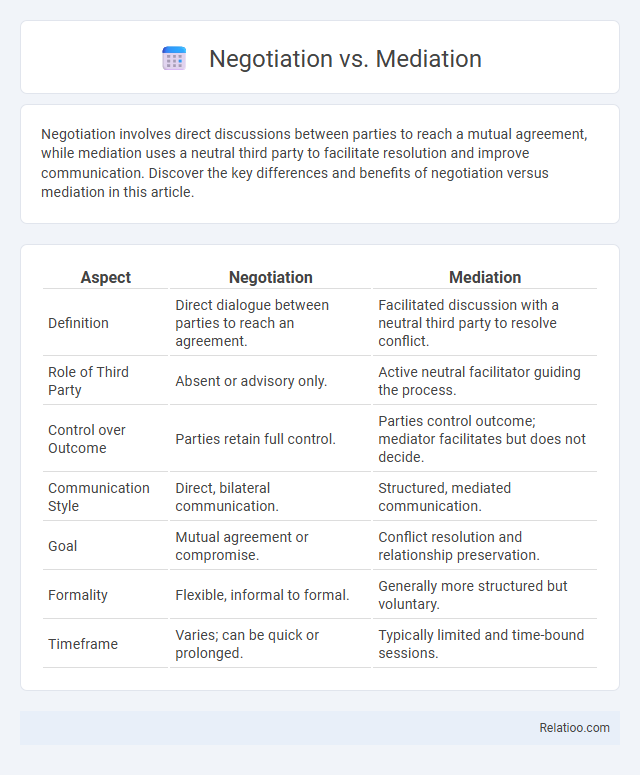Negotiation involves direct discussions between parties to reach a mutual agreement, while mediation uses a neutral third party to facilitate resolution and improve communication. Discover the key differences and benefits of negotiation versus mediation in this article.
Table of Comparison
| Aspect | Negotiation | Mediation |
|---|---|---|
| Definition | Direct dialogue between parties to reach an agreement. | Facilitated discussion with a neutral third party to resolve conflict. |
| Role of Third Party | Absent or advisory only. | Active neutral facilitator guiding the process. |
| Control over Outcome | Parties retain full control. | Parties control outcome; mediator facilitates but does not decide. |
| Communication Style | Direct, bilateral communication. | Structured, mediated communication. |
| Goal | Mutual agreement or compromise. | Conflict resolution and relationship preservation. |
| Formality | Flexible, informal to formal. | Generally more structured but voluntary. |
| Timeframe | Varies; can be quick or prolonged. | Typically limited and time-bound sessions. |
Introduction to Negotiation and Mediation
Negotiation involves two or more parties communicating directly to reach a mutually acceptable agreement, emphasizing collaborative problem-solving and compromise. Mediation introduces a neutral third party who facilitates dialogue between disputing parties to help them find a voluntary resolution without imposing decisions. Understanding the dynamics and roles in both negotiation and mediation is essential for selecting the appropriate conflict resolution strategy tailored to the context and desired outcomes.
Defining Negotiation: Key Features and Processes
Negotiation is a strategic dialogue between two or more parties aimed at reaching a mutually beneficial agreement, characterized by direct communication, compromise, and problem-solving. Key features include voluntary participation, flexibility in discussing terms, and a focus on interests rather than positions. Your ability to engage effectively in negotiation involves understanding the interests of all parties and crafting solutions that address those needs while maintaining positive relationships.
Understanding Mediation: Core Principles and Procedures
Mediation centers on a neutral third party facilitating communication between disputing parties to reach a voluntary, mutually acceptable solution without imposing a decision. Core principles include confidentiality, impartiality, and self-determination, ensuring that participants control the outcome. Procedures typically involve joint sessions to identify issues, private caucuses for candid dialogue, and agreement drafting to formalize resolutions.
Primary Differences Between Negotiation and Mediation
Negotiation is a direct communication process where you and the other party work collaboratively to reach a mutually acceptable agreement without involving a third party. Mediation involves a neutral third-party mediator who facilitates the discussion, helping both sides explore options and find common ground while remaining impartial. The primary difference lies in control: negotiation empowers you to drive the outcome independently, whereas mediation provides structured support and guidance to resolve conflicts more effectively.
Advantages of Negotiation in Conflict Resolution
Negotiation offers direct communication between parties, enabling tailored solutions that address specific interests and foster mutual understanding. It is cost-effective and preserves relationships by encouraging collaboration without third-party intervention. This method also allows for flexible outcomes and quicker resolutions compared to mediation or arbitration processes.
Benefits of Mediation for Dispute Settlement
Mediation offers a confidential and cost-effective approach to dispute settlement, allowing parties to maintain control over the outcome without the need for prolonged litigation. Your ability to engage in open communication with a neutral mediator fosters mutual understanding and helps preserve relationships, making it an ideal solution for resolving conflicts amicably. Compared to negotiation and arbitration, mediation provides a flexible, non-binding process that encourages creative problem-solving tailored to the unique needs of all involved.
Common Scenarios for Using Negotiation vs. Mediation
Negotiation is ideal when parties seek a direct, informal resolution without third-party involvement, commonly used in business deals, salary discussions, and contract agreements. Mediation becomes essential in disputes requiring neutral facilitation, such as family conflicts, workplace disputes, or community disagreements, where emotions run high and communication is strained. Your choice between negotiation and mediation depends on the need for control, formality, and the presence of a neutral mediator to help reach a mutually acceptable solution.
Skills Required for Effective Negotiation and Mediation
Effective negotiation requires strong communication, active listening, and emotional intelligence to understand and influence the other party's interests. Mediation demands impartiality, conflict resolution skills, and the ability to facilitate open dialogue between disputing parties without imposing decisions. Your success in both negotiation and mediation hinges on mastering empathy, problem-solving, and adaptability to navigate complex interpersonal dynamics.
Choosing the Right Approach: Factors to Consider
Choosing the right dispute resolution approach depends on factors such as the complexity of the conflict, the relationship between parties, and desired outcomes. Negotiation suits situations where direct communication and mutual agreement are possible, while mediation benefits from a neutral third party to facilitate understanding and compromise. Your decision should consider the level of control you want over the process and the need for confidentiality or formal agreement enforcement.
Conclusion: Negotiation or Mediation—Which is Best?
Negotiation offers direct communication and control over outcomes, making it ideal for parties seeking flexible and speedy resolutions without third-party intervention. Mediation provides a structured environment with a neutral facilitator, enhancing cooperation and mutual understanding, especially useful in complex or emotionally charged disputes. The best choice depends on the dispute's nature and the parties' willingness to collaborate, with negotiation favoring autonomy and mediation supporting guided consensus-building.

Infographic: Negotiation vs Mediation
 relatioo.com
relatioo.com